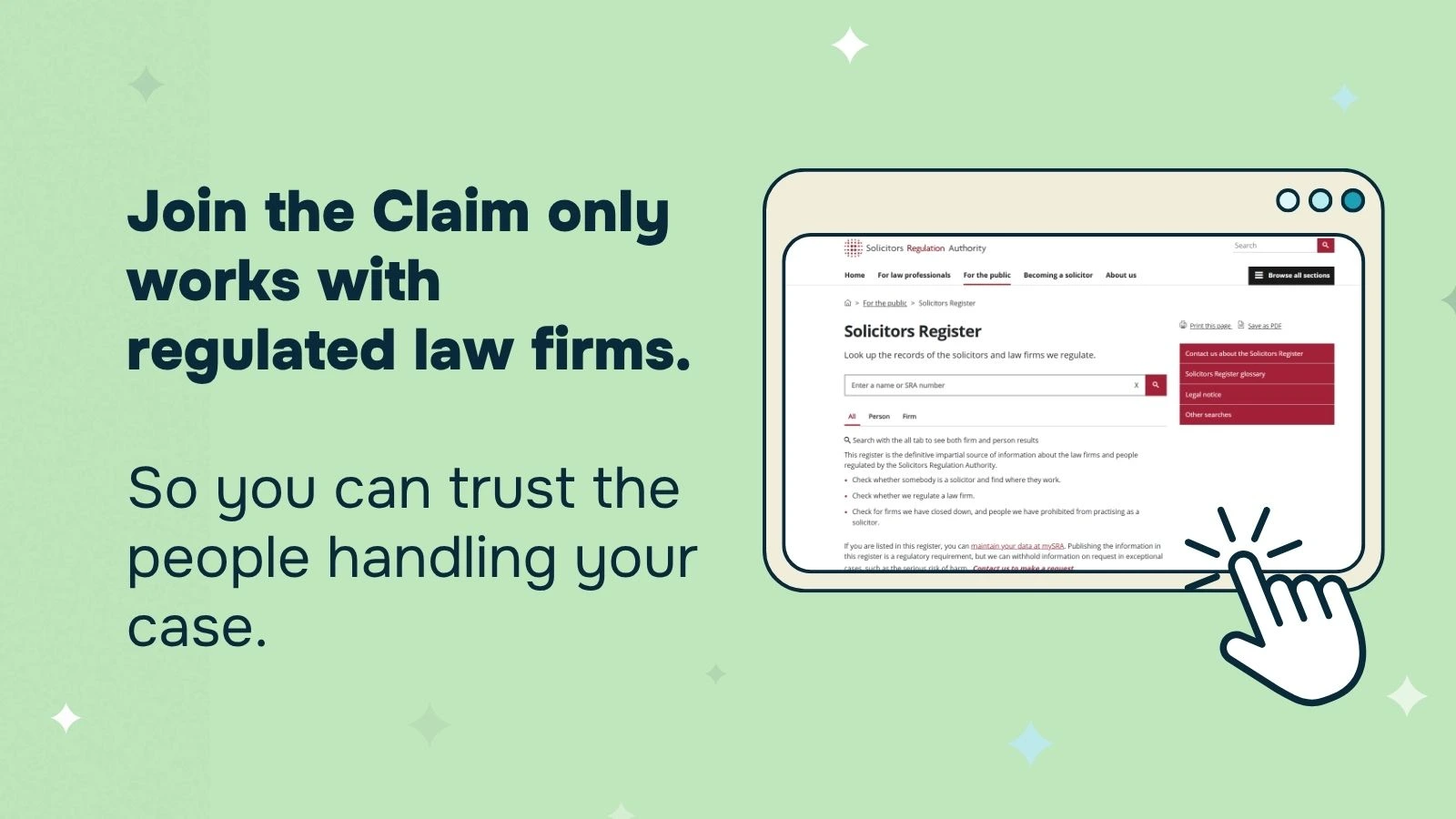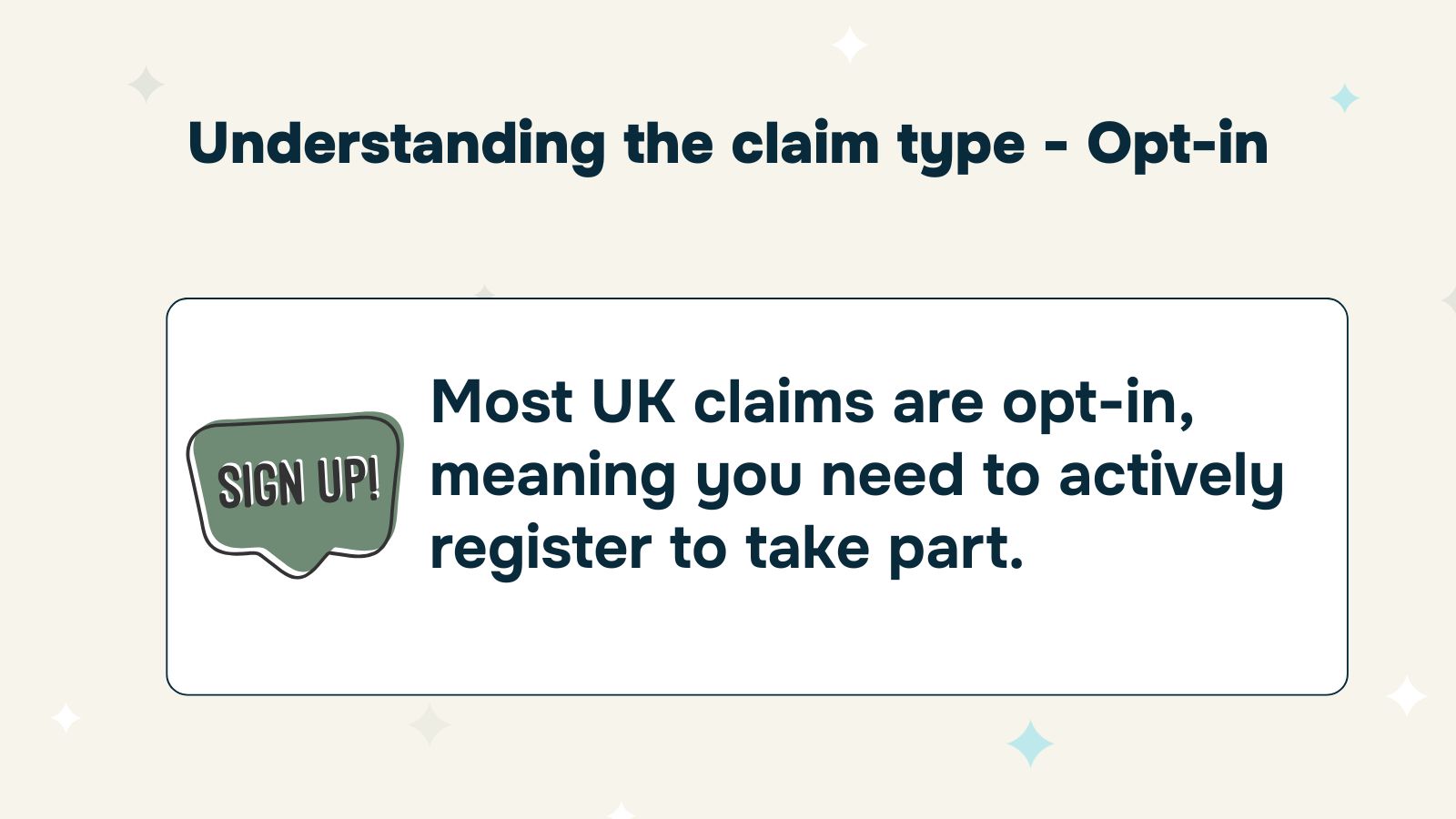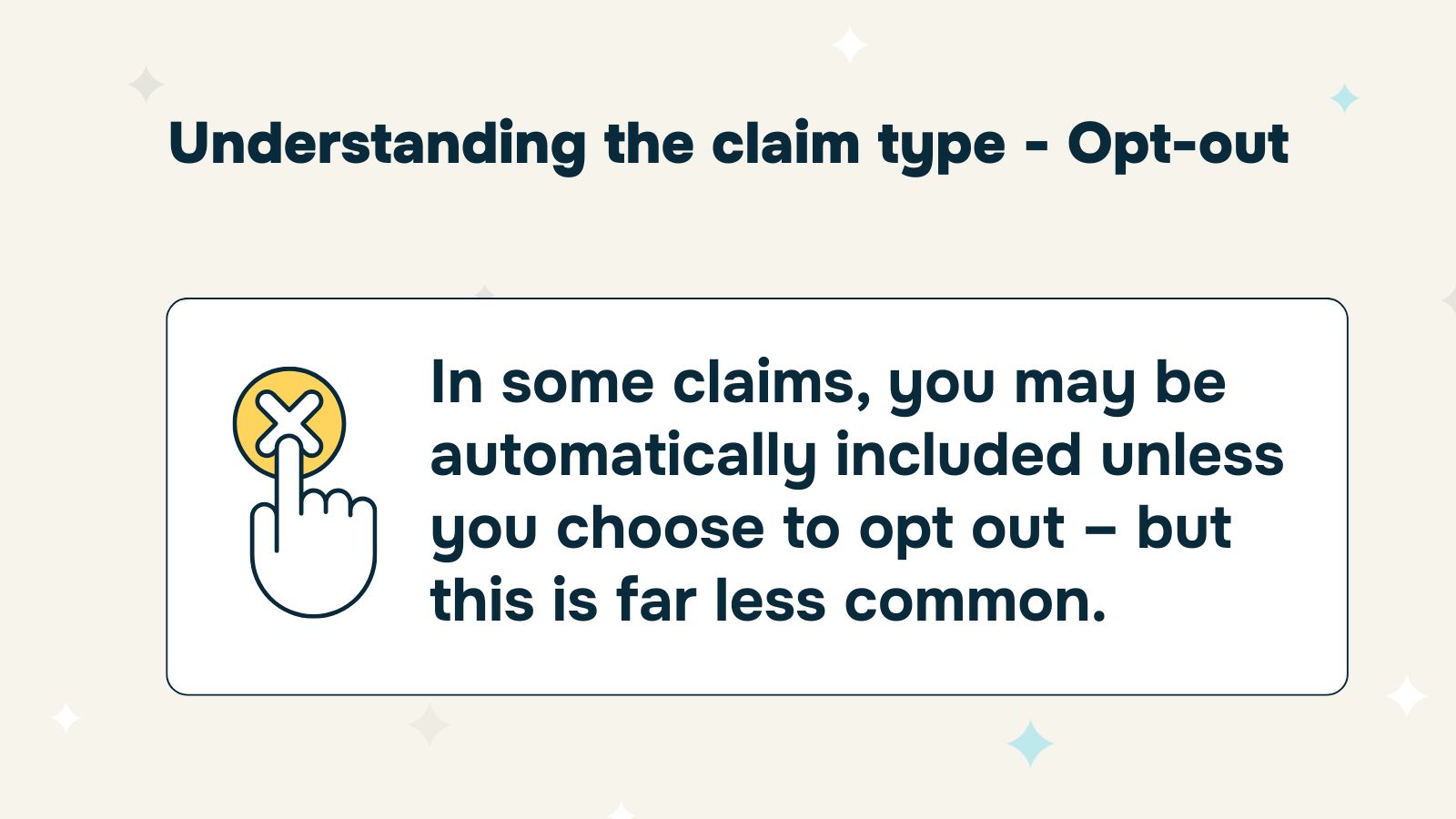
Group litigation – sometimes called a group action or class action – allows people with similar complaints to take joint legal action against a company or organisation.
This guide breaks down the legal jargon so you can understand your rights, see how group claims work, and decide if you’re eligible to join.
Let’s demystify the world of group litigation, one term at a time
We take a look at some of the most commonly used terms in group litigation so you can understand your rights, follow the process with confidence, and take action if you’re eligible for a compensation claim.
If you’ve ever felt wronged by a company – whether due to a data breach, faulty product, or unfair pay – you’re not alone. Across the UK, thousands of people are joining forces to stand up against corporate misconduct.
Through class action lawsuits, everyday consumers can level the legal playing field and demand accountability from powerful organisations. But navigating the legal jargon isn’t always straightforward. Legal terms can be confusing, and the language surrounding group claims is often full of phrases more suited to lawyers than the public they’re supposed to protect.
That’s where this guide comes in.
Before you dive in, it helps to get familiar with the building blocks of group litigation.
Whether you’ve heard terms like “GLO” or “class action” and aren’t quite sure what they mean, or you’re trying to work out how group claims actually work in the UK, this section covers the essentials. These are the key legal concepts you’re likely to come across – explained simply, so you can feel informed, not overwhelmed.
A legal process where multiple individuals with similar claims join together to sue a common defendant. Instead of filing separate cases, their claims are combined, making the process more efficient and cost-effective.
The term used predominantly in the US to describe group litigation. In the UK, “group action” or “GLO” is more accurate, but the principles are similar.
A formal court order that allows similar claims to be managed collectively. A GLO is the mechanism through which group litigation is officially recognised and organised in England and Wales.
The Group Register is a formal list of all the claimants who are part of a Group Litigation Order (GLO). Only individuals on the Group Register will benefit from any settlement or court award. If you're not on it, you're not officially part of the group action - even if you completed an eligibility form online. That’s why registering and signing all necessary documents is essential.
Refers to which country’s courts have the authority to hear a case. Some group claims involve international elements, so knowing the proper jurisdiction is key.
The legal deadline for bringing a claim. If you wait too long, you may lose your right to take legal action - even if your claim is valid. Group claims often have strict timeframes, so it's important to act quickly.
Behind every group action are real people playing different roles. Whether you’re thinking about joining a claim or just want to understand the process better, it helps to know who’s who. Here are the key players in any group litigation:
This is you – or anyone bringing a legal complaint as part of the group. In group litigation, claimants are people who’ve experienced harm (like a data breach, faulty product, or unfair treatment) and want justice alongside others in the same situation.
The company, organisation, or public body being taken to court. In most group actions, the defendant is a business accused of wrongdoing – for example, breaching consumer rights or mishandling personal data.
The SRA is the independent body that regulates solicitors and law firms in England and Wales. It ensures legal professionals follow strict rules around ethics, conduct, transparency, and client care.
This is the legal team that represents you. To protect your rights, these firms must be authorised by the Solicitors Regulation Authority (SRA) or another approved legal body. A regulated law firm must follow strict professional standards – including being clear about fees, acting in your best interests, and keeping your information safe.
Always check if your legal representatives are SRA-authorised.
Join the Claim only works with SRA-authorised law firms – so you can trust the people handling your case.
In larger group claims, one or a few claimants are sometimes selected to go first. These are known as lead cases or test claims. These cases tackle the big legal questions and help set the direction for the rest of the group. The outcome can influence how all the other claims are handled.

Worried about legal costs? The good news is most group actions are designed to minimise risk for claimants. From no win, no fee agreements to third-party funding and insurance, there are several ways to make legal action affordable and accessible.
Here’s a breakdown of the key funding terms, so you know exactly what to expect – and what you won’t have to pay upfront.
A general term for legal agreements where you don’t pay your solicitor if the case is unsuccessful.
The two main types of no win, no fee agreements used in group litigation are Conditional Fee Agreements (CFAs) and Damages-Based Agreements (DBAs). Both are designed to reduce financial risk for claimants and make legal action more accessible.
A Conditional Fee Agreement (CFA) is a popular no-win, no-fee funding method in group litigation. When claimants sign up to a CFA, they don’t have to pay anything upfront. The legal team that represents the claimants will only earn fees if they win the case. If the case is won or settled, the law firm charges a “success fee” in addition to their standard costs.
Often, the law firm combines the success fee and standard costs into one percentage. This means you have a clear idea about how much of your compensation will go toward legal fees, ensuring you’re never surprised by unexpected charges.
A Damages-Based Agreement (DBA) is another no-win, no-fee funding option for group litigation (although it’s not as popular as a CFA).
With a DBA, the law firm’s fees are capped at a pre-agreed percentage of the compensation awarded, meaning you’ll only ever pay a set portion of your damages, up to a maximum of 50% by law. There is no separate success fee with a DBA.
No win, no fee sounds simple – and it often is – but it’s still a legal agreement. That’s why it’s important to read the terms carefully before signing. If anything’s unclear, ask questions.
This is financial backing provided by a third party (not the claimant or legal firm) to cover legal costs. In return, the funder typically receives a share of any compensation won. This makes it possible for people to take on big companies without incurring huge upfront legal bills.
Usually, your law firm will take out an insurance policy (known as After-the-Event or ATE insurance) on behalf of all claimants. This insurance protects claimants from the risk of paying the defendant’s legal costs if the case is lost.
Not sure if you’re eligible to take part in a group claim, or what happens if you are? You’re not alone. Joining a group action might sound complex, but the process is designed to be simple and accessible.
From checking if you qualify to getting properly signed up, this section explains the key steps – and how platforms like Join the Claim help guide you through them.
Getting involved in a group claim is more straightforward than you might think. Here’s how the process typically works:
Start with a quick online check to see if you qualify for the claim. This usually involves confirming key details – like whether you bought a certain product, worked for a particular company, or were affected by an event such as a data breach.
If you're eligible, you’ll be asked to register with the law firm. This is how you officially join the claim. You’ll provide your details, upload any evidence, complete ID checks, and sign the necessary forms to confirm your participation.

Sites like Join the Claim make the whole process easier. We help you:
If you’re not sure where to start or want to know your rights, consumer hubs are a simple, supportive first step.

Once a group claim is underway, it follows a formal legal process – often through the High Court or a specialist tribunal.
While your legal team handles most of the day-to-day work, it’s useful to understand how group litigation moves through the courts, what key terms mean, and where your case might be heard.
This section breaks down the essentials so you can follow the process with confidence.
Group litigation is usually handled by the High Court of England and Wales. Because these cases often involve many people and complex legal issues, they require the authority and expertise of a higher court.
The CAT is a specialist court that deals with competition law – for example, cases where companies are accused of price fixing or abusing market power. It also oversees rare but growing “opt-out” collective proceedings in consumer and digital markets.
If a decision made in group litigation is challenged, the case may be taken to the Court of Appeal. This court reviews whether the original legal judgment was correct and fai
A precedent is a past legal decision that guides how future cases are handled. In group litigation, lead cases often set precedents that shape the outcome of similar claims.
Disclosure is the stage where both sides must share all relevant evidence. In group claims, this can include thousands of internal documents and emails from the defendant, which your legal team will review to help build the case.
Group litigation can sound complex, but the process follows a clear structure. Here’s what usually happens – step by step:
A legal team investigates a potential wrongdoing – like a data breach, faulty product, or unfair employment practice – affecting a large group of people.
Law firms or consumer hubs (like Join the Claim) begin spreading the word. People who may be affected are invited to check their eligibility and register their interest.
You complete a quick eligibility form. If you're eligible, you’ll go through onboarding – this means sharing your details, evidence, and signing legal documents (like a no win, no fee agreement).
The law firm applies to the High Court for a Group Litigation Order – the official mechanism that allows the claims to be grouped together and managed collectively.
Once the GLO is granted, eligible claimants are added to the Group Register. This is the formal list of everyone included in the claim. Only people on the register are entitled to compensation if the case succeeds or settles.
The court process gets underway. A lead case or test claim might be chosen to deal with common legal issues first, which helps guide the rest of the group claims.
Both sides share relevant evidence – often thousands of internal documents from the defendant. The legal team uses this to build the case and strengthen the group’s position.
Many group cases settle before reaching court – meaning the defendant agrees to pay compensation without admitting fault. If not, the case may go to trial, where a judge decides the outcome.
If the claim is successful, compensation is awarded and distributed to the registered claimants – usually minus legal fees as outlined in your funding agreement.
Group claims can involve thousands of people, piles of paperwork, and mountains of data. That’s where technology comes in.
Today’s legal teams use smart tools to manage cases more efficiently, keep claimants informed, and strengthen their arguments with data-driven insights. Here’s how digital tools are helping level the playing field – and speeding up the journey to justice.
Modern legal teams use cloud-based platforms to manage thousands of claimants efficiently. These platforms allow secure communication, status updates, and evidence tracking.
Powerful software is used to assess the strength of group claims. It can find patterns in thousands of documents, helping lawyers build strong cases and identify eligible claimants faster.
These are pre-programmed processes (like sending update emails or collecting ID verification) that help law firms manage group claims more efficiently.
One of the most common questions people ask is: “What will I actually get if the case wins?”
In group litigation, outcomes usually come in the form of compensation – either through a settlement or a court award. This section explains how compensation works and what happens if your case is resolved before trial.
This is the money you may receive if your group litigation claim is successful. Compensation can come in two ways: through a settlement, where the defendant agrees to pay without going to trial, or through damages, which are awarded by the court if the case is won. It’s designed to reimburse you for the harm or loss you’ve experienced – whether that’s financial, emotional, or related to your rights as a consumer or employee. Compensation amounts vary depending on the nature of the claim, how many people are involved, and how badly individuals were affected.
A settlement is when the parties in a legal case agree to resolve the dispute without going to a full trial. In group litigation, settlements are common.
Settlements can be reached at any stage of the legal process. For claimants, this means quicker resolution and guaranteed outcomes - without the uncertainty of a trial.
“Damages” is the legal term for the compensation awarded by a court when a claim is successful. In group litigation, this means the judge has found the defendant legally responsible and has ordered them to pay money to affected claimants.
The amount awarded can vary depending on how serious the impact was and how many people are involved in the claim.
When you join a group claim, you’ll be asked to review and sign a few key legal documents.
These aren’t just formalities – they make sure everything is transparent, accurate, and properly recorded. From confirming your details are correct to outlining how your claim will be funded, these documents help protect your rights and keep the process running smoothly.
Here’s what you might come across and why each one matters.
A Statement of Truth is a formal declaration that confirms the information you've provided in your legal claim is accurate to the best of your knowledge. When you join a group action, you may be asked to sign a statement confirming that:
Giving false information could lead to your claim being rejected or further legal consequences, so it’s important to be honest and accurate.
When you’re onboarded to a group litigation case, the law firm representing you will send you a Client Care Letter (sometimes called an “engagement letter”). This document outlines:
The Client Care Letter ensures everything is clear, fair, and written down before your legal team starts work. You should always read it carefully and ask questions if anything is unclear.
This formal legal document sets out the full details of the claim being made. It includes facts, legal arguments, and what the claimants are asking the court to do (usually financial compensation).
Understanding your rights shouldn’t feel like decoding a legal dictionary – and now, it doesn’t have to.
This guide was created to cut through the legal jargon and give you the clarity you need to make informed decisions. Whether you’re concerned about a data breach, unfair treatment, or faulty products, group litigation could offer a path to justice.
Think you might have a claim? Check out live claims on our website, and use our quick eligibility checks to find out which claims you could join.
If you’re eligible, we’ll guide you through the process and connect you with a regulated law firm ready to act on your behalf.
Bee is the content lead at Join the Claim, where she helps people understand their rights and take action when they’ve been wronged. With a background in PR, copywriting, and content strategy, she’s spent over a decade writing about legal matters – turning complex topics into clear, accessible resources that inform and empower.
From writing about data breaches to explaining how group claims work, Bee’s goal is always the same: to give people the confidence they need to take the next step. She’s committed to making legal information feel human, relevant, and easy to trust.
Disclaimer
This guide is for general information purposes only and does not constitute legal advice. While we’ve made every effort to explain group litigation terms clearly and accurately, individual circumstances vary, and you should always seek advice from a qualified legal professional before making decisions about a claim.
Join the Claim is not a law firm and does not provide legal representation. We work with regulated UK law firms and help connect eligible individuals to group actions managed by authorised legal professionals.
Last Updated: 23 June 2025
Sign up for our newsletter to stay up to date.

We connect consumers with their legal dream teams to ensure they get the compensation and support they deserve.
Join the Claim is not a law firm. We connect individuals with top law firms for group action claims, and our service is free to use. While we may receive a fee from the law firms we introduce you to, this will not affect your costs or compensation. We are not responsible for the advice or services provided by these firms. Please note, nothing on this website is legal advice, and while we check claim eligibility, we cannot guarantee a law firm will accept a case.
Join the Claim is a registered trading name of Big on Media ltd. Big on Media is registered in the United Kingdom under licence number 09878028 with its registered office located at Big on Media, 6 Sunderland Street, Tickhill, Doncaster, DN11 9QJ
© Join the Claim All Rights Reserved | 2025